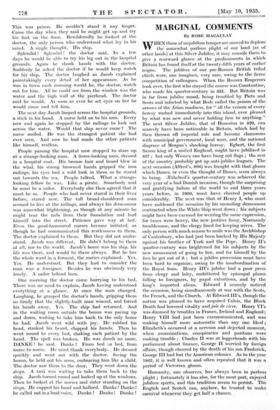MARGINAL COMMENTS
By ROSE MACAULAY
WHEN those of unjubilose temper arc moved to deplore the somewhat parlous plight of our land (as of other lands) at this Silver Jubilee, it may console them to give a rearward glance at the predicaments in which Britain has found itself at the twenty-fifth years of earlier reigns. The jubilees of our pre-Roman British tribal chiefs were, one imagines, very rare, owing to the fierce competition of colleagues. When the Roman Emperors took over, the first who stayed the course was Constantine, who made his quarter-century in 831. But Britain was in far from jubilee mood, being troubled by Picts and Scots and infected by what Bede called the poison of the arrows of the Arian madness, for "all the venom of every' heresy rushed immediately into this island, ever pleased by what was new and never holding firm to anything." The next Silver Jubilee, that of Honorius in 420, can scarcely have been noticeable in Britain, which had by then thrown off imperial rule and become clamorous with municipal government, local wars, and the national, disgrace of Morgan's shocking heresy. Egbert, the first Saxon king of a united England, might have jubilized in 827; but only Wessex can have hung out flags ; the rest of the country probably got up anti-jubilee leagues. The next occasion (Alfred's, 896) was fraught with that gloom which Danes, or eVen the thought of Danes, seem always to bring. /Ethelred's quarter-century was achieved the very year of a bad Danish invasion, though the surprising and gratifying failure of the world to end three years years before, in 1000, must have cheered people up considerably. The next was that of Henry I, who must have saddened the occasion by his unsmiling demeanour contracted when the White Ship went down ; his subjects might have been excused for wearing the same expression, for taxes were heavy, the, new justices fussy, Normandy. troublesome, and the clergy fined for keeping wives. The only person with much reason to smile was the Archbishop of Canterbury, who had just been backed by His Majesty against his brother of York and the Pope. Henry II's quarter-century was brightened for his subjects by the new amusement of going to law, and for himself by the fees he got out of it ; but a jubilee procession must have been hard to organize, owing to the insubordination of the Royal Sons. Henry III's jubilee had a poor press from clergy and laity, embittered by episcopal plums falling to foreigners, by papal extortions, and by the king's imported aliens. Edward I scarcely noticed the occasion, being simultaneously at war with the Scots, the French, and the Church. At Edward III's, though the nation was pleased to have acquired Calais, the Black Death had lowered vitality and joie de vivre. Henry VI's was dimmed by troubles in France, Ireland and England; Henry VIII had just been excommunicated, and was making himself more autocratic than any one liked ; Elizabeth's occurred at a nervous and dejected moment, when assassinations, conspiracies and puritans were making trouble ; Charles II was at loggerheads with his parliament about finance, George II worried by foreign affairs, though cheered by the death of his son Frederick, George III had lost the American colonies As to the year 1862, it is well known and often repeated that it was, a period of Victorian gloom. • Humanity, one observes, has always been in parlous plight ; fortunately it has also, for the most part, enjoyed jubilose spirits, and this tradition seems to persist. The English and Scotch can, anyhow, be trusted to make carnival whenever they get half a chance.


































































 Previous page
Previous page